From kelp burgers to seaweed bacon, sustainable food entrepreneurs are innovating to attract the omnivorous appetites of humans.
When vertebrates first ventured out of the ocean around 390 million years ago, life on land was quite favorable: the atmosphere was rich in oxygen and food competition was virtually nonexistent, with a clear boundary between ocean and land. Fast forward to 2022, life on land has become much more vibrant. The Earth’s population is projected to reach 9.7 billion by 2050; experts estimate that food production will need to increase by 70% to keep up with that growth.
Traditional intensive farming methods soon will no longer be a viable option due to the significant environmental impacts they entail. These trade-offs include “habitat fragmentation and threats to biodiversity, greenhouse gas emissions from land clearing, fertilizers, and livestock farming, and nutrient depletion from fertilizers harming marine, freshwater, and terrestrial ecosystems.”
According to a 2018 farm-to-fork study analyzing 40,000 farms that produce 90% of the food consumed on the planet, we must abandon meat and dairy products if we want to sustain ourselves in the coming decades. Americans spent $1.4 billion on plant-based meat retail (found in 19% of households) in 2021, accounting for a 2.7% share of all retail packaged meat.
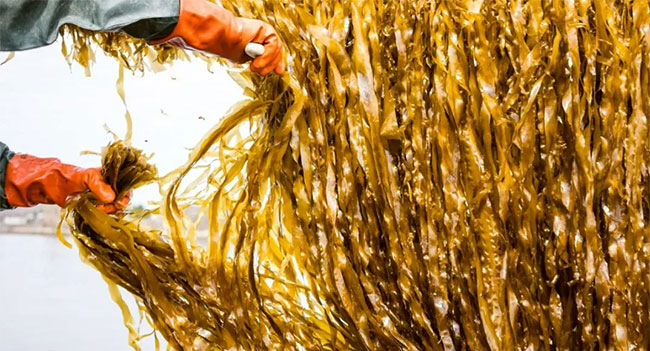
Seaweed has been a staple food in East Asian diets.
Plant-based food companies Beyond Meat and Impossible Foods—two well-known names in the current plant-based meat market in the U.S.—claim that their burgers use significantly less land and water, and generate fewer greenhouse gases compared to traditional beef burgers.
While seaweed has been a staple in East Asian diets for hundreds of years—South Koreans consumed 20.4 pounds of seaweed per capita in 2020—it remains a premium food in Western countries. Mark Kulsdom, a former animal rights activist, believes that seaweed needs branding.
For instance, in the Netherlands, people are very interested in this food. Royal Kombu (also known as sugar kelp) is harvested from the Netherlands’ first organic seaweed farm, enriching and flavoring the soy-based pâté of Dutch Weed Burger. The dish is served on a green spirulina bun, garnished with a sea lettuce sauce.
The burger is described as having a distinctive and special feature, combining familiar flavors with new tastes. People do not need to associate it with a meat substitute; rather, it should be seen as an independent plant-based burger.
The Dutch Weed Burger is also vegetarian, but aimed at meat lovers who crave meat. A decade after launching their first product, Kulsdom and his partners now generate about $1.4 billion annually from their burgers. They seem to be making people rethink and adjust their habits.
For Kulsdom, it appears he is trying to change the culture of eating. He believes that sometimes people need to take an unconventional approach to everything. When everyone gets what they already know, it’s no longer exciting. When their curiosity is awakened, that’s when new things and ideas can enter their minds.
AKUA, a meat alternative company made from kelp based in Brooklyn, New York, collaborates with GreenWave (a nonprofit network of regenerative ocean farmers), providing its aquaculture products from sustainable farms in New England. Founder Courtney Boyd Myers, an entrepreneur who has long prepared seaweed as a home dish, made an environmental promise after visiting GreenWave’s Connecticut farm in 2016. AKUA was born three years later to spread the word.
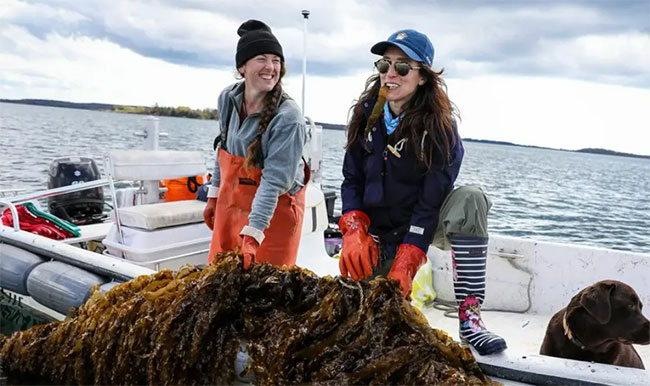
AKUA founder Courtney Boyd Myers (right) harvesting some kelp.
In 2008, researchers discovered 14,000-year-old pieces of seaweed in southern Chile that were pressed into cakes and chewed like tobacco. Scientists found that all nine species of seaweed recovered in this area are “excellent sources of iodine, iron, zinc, protein, hormones, and a variety of trace elements, particularly cobalt, copper, boron, and manganese,” with secondary beneficial effects including supporting cholesterol metabolism, enhancing calcium absorption in bones, antibiotic effects, and boosting the body’s infection resistance.
Boyd Myers explains that her company uses a blend of sugar and lean kelp—a new variety of sugar kelp—in all products, including jerky and burgers. AKUA’s spicy chili and lemon Kelp Jerky contains a type of microalgae known as spirulina. Meanwhile, Kelp Burgers and Krab Cakes include “water lentils” or duckweed, which contain up to 45% protein. In the future, they aim to incorporate various types of seaweed into their products, as long as they are grown sustainably.
Like Kulsdom, Boyd Myers acknowledges that kelp needs a thoughtful supply. Their Kelp Jerky is over 70% kelp, but the reality is that kelp is too luxurious for the average consumer. AKUA is in the process of reformulating it. She mentions that the company has reduced kelp to about 30% in its Kelp Burger recipe, blending its flavor with more familiar tastes like tomatoes, extra virgin olive oil, black beans, and quinoa. People really love the burger, regardless of whether they like seaweed or not.
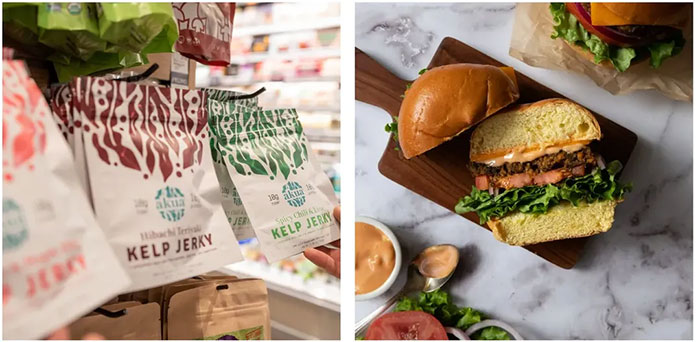
Seaweed products.
However, in the restaurant context, explaining what a kelp burger is to customers through the menu is not as straightforward as most professional chefs would like. Boyd Myers states that the company’s plant-based Krab Cake will win much faster in the food service for this reason. Most people will immediately understand what a plant-based cake is, and the fact that it is made from kelp—a type of ocean plant—makes it truly meaningful.
She also argues that these dishes are worth making. Kelp grows very quickly, making it even more efficient than most land plants in absorbing carbon dioxide and converting it into biomass and oxygen. Our oceans are among the largest carbon dioxide absorbers, so kelp forests and kelp farms play a crucial role in combating climate change, helping to cleanse the oceans.
Researchers hope to one day isolate large amounts of carbon by sinking kelp deep into the ocean. A 2019 research review showed that the technology needed to implement this at a meaningful scale does not yet exist. However, over 48 million square kilometers of ocean suitable for seaweed farming could benefit at least 77 countries by acting as a carbon sink, buffering nutrient-rich, oxygen-depleted, and acidic waters. Seaweed farming is not the only solution to climate change, but it provides a valuable new tool for a more sustainable future.
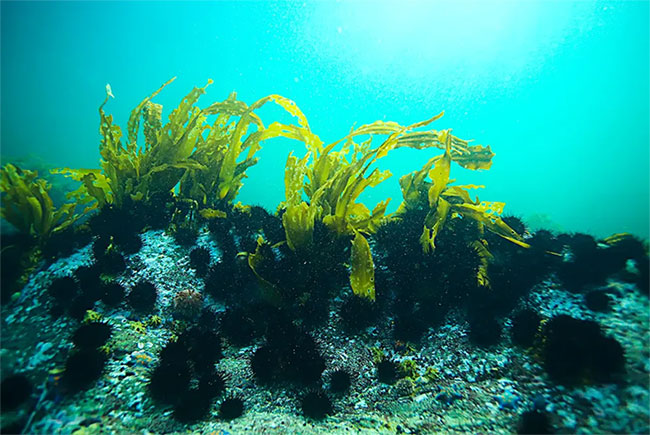
Kelp grows very quickly.
The category of plant-based meat includes similar products, meaning those designed to mimic the form, texture, and flavor of animal meat. These products accounted for 90% of U.S. sales last year, while black bean and vegetable products made up the remaining 10%.
Umaro Foods has launched seaweed bacon at three eateries in San Francisco, Nashville, and New York City. The company’s patent-pending protein is a functional substitute for heme, the red pigment precursor of hemoglobin, allowing some plant-based products to mimic meat, with the same color and umami-enhancing properties. Co-founders Beth Zotter and Amanda Stiles aim to draw attention with their innovation.
They believe you cannot blame people for eating less meat. You have to create something that tastes delicious while still providing the nutritional components people expect. Seaweed bacon is a product famously hard to give up for vegetarians. It’s like a drug that makes people feel like they are eating real meat. They are genuinely excited to offer new products that allow people to cut back on meat.
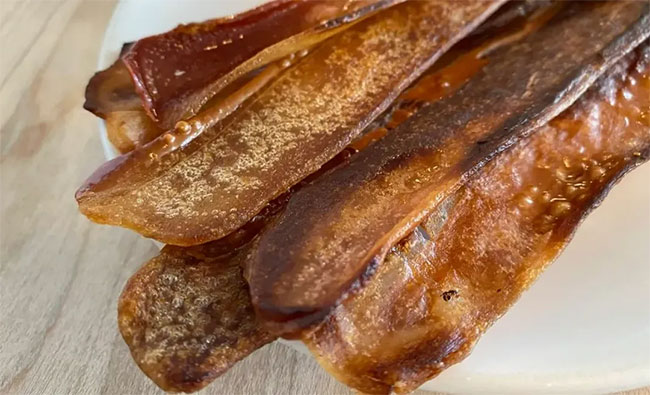
Seaweed bacon.
Kelp has a relatively low protein content, but Umaro Foods has discovered another aquatic plant that can provide it in abundance. Zotter explains that the type of seaweed we are currently using is red algae, particularly nori, which actually contains up to 40% protein—higher than even soybeans. Zotter mentioned that they see potential in technology and even traditional breeding programs to increase the protein content of seaweed, transforming it into a large-scale, high-quality protein source that can compete with soybeans in terms of cost and scale. Currently, Umaro’s four varieties of smoked seaweed bacon have an exclusive protein profile with 240 calories, providing a gram of protein.
Zotter and her associates are not just looking to seaweed for protein. The smoked bacon utilizes protein but also incorporates hydrocolloids, which are gels that make seaweed soft and airy. These hydrocolloids are being used by her company to create a fat analog. One of the factors that make bacon delicious is its fat content. The hydrocolloid in seaweed is used to wrap vegetable oils such as sunflower and coconut oil, essentially creating a mouthwatering sensation, crispy texture, and releasing animal fats. This is one of their innovations awaiting patent approval.
At the Egg Shop in New York—one of the first three restaurants to serve smoked seaweed bacon—tasters were extremely pleased with the rich flavor and crispness of the dish. The Umaro Foods team hopes to build on the momentum of success stories in alternative protein, such as Beyond Meat and Impossible Foods, to guide meat-eaters toward more sustainable and scalable alternatives. They warmly welcome companies like Zotter’s, as there is always room in a growing market for more competition, which will improve products, benefiting everyone.


















































